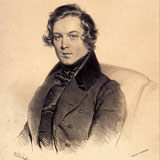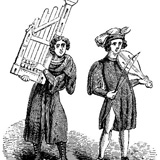Palestrina Did Save Church Music
 |  |
| New findings suggest Giovanni Palestrina (shown right) was the clear victor over Pope Paul III (left) in the war on music c.1565. | |
Trent- Some new musicological findings may change the way musicians think about Giovanni Palestrina. "We always thought that Palestrina was just one of many soldiers who fought against the vicious anti-polyphonic campaigns of Pope Paul III," says Didier Naissance, Professor of Musicology at Binchois University, "apparently we were wrong."
This sudden shift in thought was caused by a recently discovered letter written by Bishop Alfonso Tartini, a member of the Council of Trent (which would decide the fate of church music), to his sister, Florinda da Sospir. In this letter, Bishop Tartini clarifies the interaction between Pope Paul III and Giovanni Palestrina during the Council of Trent.
Tartini relates that after the papal choir had performed Palestrina's Missa Papae Marcelli the Pope was displeased with the composer's attempts to create a clear delineation of text, calling the new mass "lascivious, worldly , bizarre and rather dull". To which Palestrina responded, "Bring it on, Hussite!" The Pontiff immediately rose to his feet and lunged towards Palestrina, tripping on his exquisite velvet robe. After recovering from the nasty fall he engaged Palestrina in an old-fashioned brawl. Tartini described Palestrina as "having the athletic prowess of Charlemagne and the vocabulary of a Turk." Palestrina clearly triumphed over the Pope. A rather embarrassed Paul III commented that he could have won the fight but he was trying not to tear his "delicate and intricately woven underskirt."
While being held captive in Palestrina's unyielding headlock, the church leader had no choice but to allow the continuation of polyphony in church music. Palestrina, much to the disgust of all attending bishops, also demanded that the Pope recite a Hail Mary in the vernacular before he would release his ominous grip of doom.
"We're not sure why we in the musicological community have never heard of this," wonders Dr. Naissance, "it contradicts all other studies and defies everything we know about the relationship between clergy and church musicians during the Renaissance, but it must be true."
June 2005









